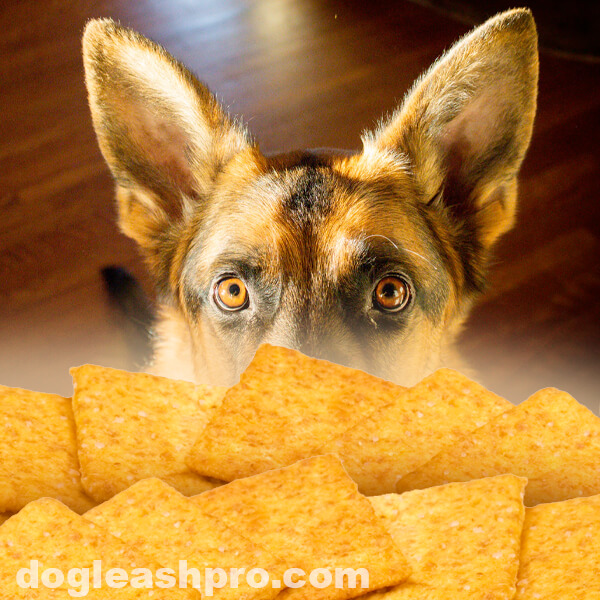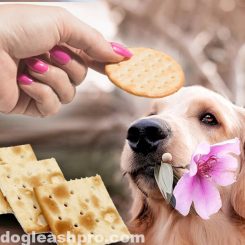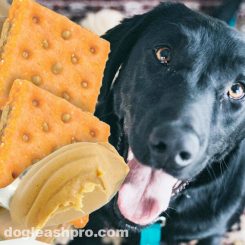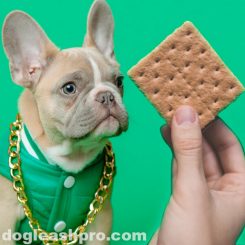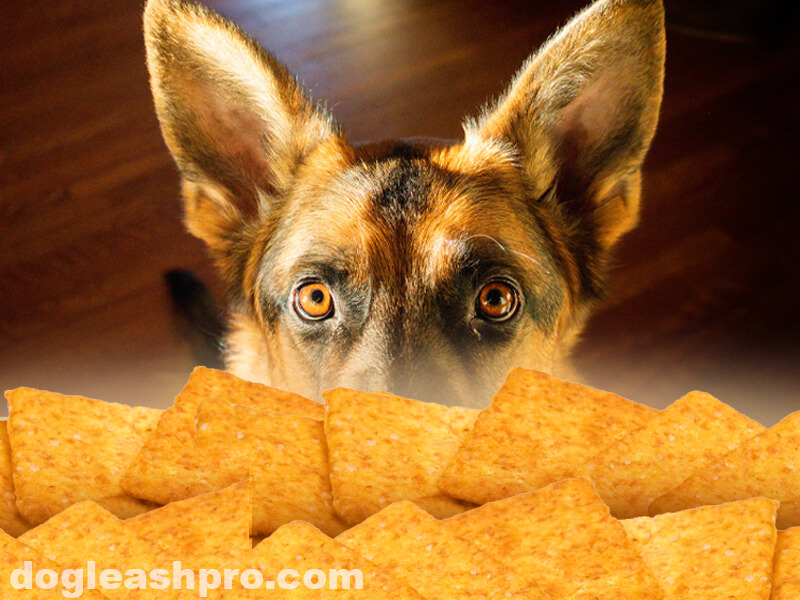
Can dogs eat Wheat Thins? No, dogs should not eat Wheat Thins because this snack is packed full of salt, sugar, fats, and carbohydrates. While Wheat Thins are not entirely harmful to dogs, it does contain BHT which is a preservative that can harm our dog’s health. If your dog is allergic to wheat, keep Wheat Thins away. If you must, consider giving them just one or two Wheat Thins occasionally.
Are you eating Wheat Thins right now or dipping them into your favorite hummus, cheese, or creamy salsa dressing? Let me guess, your dogs are probably staring at you intently with those puppy eyes.
That’s what happened to me. I was craving Wheat Thins after snacking on Cheez Its crackers for weeks and my furry friends could hear me crunching away from the other side of the house! They ran over to me but before I handed them Wheat Thins, I wondered if it was safe for doggy consumption.
Table of Contents
Can dogs eat Wheat Thins?
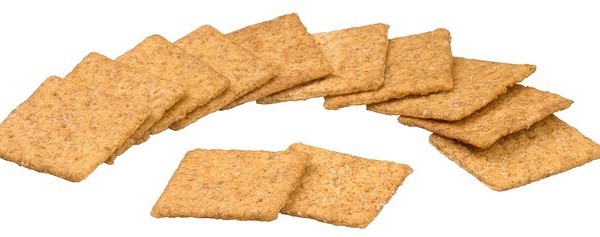
Dogs should not eat Wheat Thins. To fully understand why Wheat Thins are not healthy for dogs, let’s quickly take a look at what Wheat Thins are and the ingredients in these wheat cracker snacks.
What are Wheat Thins?
Wheat Thins is exactly what the name suggests. They are snack food that’s made for human consumption.
Many love Wheat Thins because they are baked whole-grain crackers that are crispy and crunchy. Instead of that smooth texture, you see and feel from other types of crackers, like the tiny-sized Goldfish crackers, Wheat Thins have a rough grainy homemade texture.
Ingredients in Wheat Thins
- Whole grain wheat flour.
- Canola oil.
- Sugar.
- Cornstarch.
- Malt syrup from corn and barley.
- Salt.
- Refiner’s syrup.
- Leavening from calcium phosphate and baking soda.
It is important to note that the packaging also tells us that BHT was added to the packaging material to preserve freshness.
Can dogs have Wheat Thins?
As you can see from the ingredients list, some of the ingredients are not healthy or safe for dogs. Let’s discuss each one and see how they can affect your dog’s health.
Whole grain wheat flour is safe for dogs that are not allergic to wheat
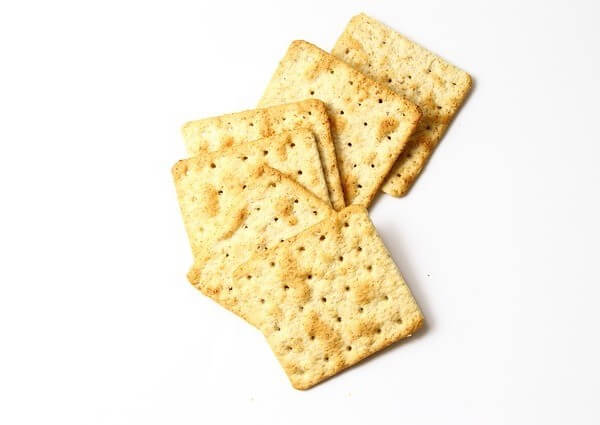
One of the main ingredients of Wheat Thins is whole grain wheat flour. If your furry friends are healthy and do not have a wheat allergy, then whole grain wheat flour is safe for them to eat and you can give them 1 to 2 crackers of Wheat Thins.
Whole grain contains three parts: the bran or outer layer which is packed full of fiber, antioxidants, and B vitamins. At the core is the germ, which is also rich in vitamins, healthy fat, protein, and minerals. Then you have the endosperm or the largest starchy part of the grain, which contains protein and carbohydrates.
As you can see, your canine friends will receive all these nutritional values from whole grain. Other health benefits that whole grains provide include:
- Reduce risk for cancers and heart disease.
- Lower cholesterol.
- Manage weight.
- Maintain blood sugar levels.
However, it is important to note that Wheat Thins should not replace any of your dog’s regular main meals. Your pups can eat Wheat Thins as an occasional snack.
When it comes to protein, make sure you’re not replacing wheat grain with their regular source of protein from chicken, beef, or pork.
Keep in mind that dogs may develop wheat allergies over time. This means that your canine pooch may not be allergic to wheat products right now, but over time with increased exposure to wheat products, your canine pooch may start to develop it.
If you’re not sure whether your pooch is allergic to wheat, make sure to consult with your vet first before handing him a Wheat Thins cracker. Your vet may ask you to bring your pup in for a checkup and perform a series of allergy tests to find out.
Canola oil is fine for dogs
There is a huge debate on whether canola oil is safe for doggy consumption. Generally, canola oil is not toxic to dogs, but it is highly processed when compared to other types of oil such as olive oil or coconut oil.
Many pet owners also argue that canola oil is likely to come from crops that are genetically modified and they don’t feel comfortable feeding their pooch food that has canola oil in it.
According to Dr. Guy Crosby of Harvard School of Public Health, canola oil is high in monounsaturated fat of about 63% and low in saturated fat of about 7% so it is considered a healthy and safe oil. Adding to that, canola oil also contains a high amount of polyunsaturated omega-3 fat of about 9 to 11%.
Dr. Crosby did point out that canola oil has been extracted with hexane so there may be hexane residual in the oil. He added that there is trans-fat in the canola oil and trans-fat is highly correlated with health problems. While this research speaks to how it affects humans, if it can cause health issues in humans, I would be wary of feeding food that contains canola oil to my two furry family members as a pet owner.
Fun Fact: Many popular snacks like Peanut Butter Crackers use canola oil. Check out our article, Can Dogs Eat Peanut Butter Crackers to find out if this snack is safe for doggy consumption.
So while canola oil is not entirely toxic to dogs, there is plenty of oil that is safer and healthier for our furry friends, which includes:
- Coconut oil: Not only does coconut help to improve your dog’s skin and coat health, but it can help with digestive issues in dogs. If you rub coconut oil over your dog’s teeth, it can also help to get rid of the yellow plague and tartar in your pup’s teeth.
- Fish oil: contains omega-3 fatty acids (DHA and EPA), which help improve skin and coat health and soothe inflammation from allergies.
- Sunflower oil: Sunflower oil provides your dog with omega-6 fatty acids, which will keep their hair healthy and shiny and their skin smooth and moisturized. Omega-6 fatty acid from sunflower oil also promotes a healthy heart in dogs.
- Olive Oil: 100% olive oil provides a healthy coat and skin in dogs as well. It also prevents diabetes and cardiovascular disease in dogs. Best of all, having olive oil can improve a dog’s immune system.
- Flaxseed oil: If your pooch has kidney problems, high blood pressure, or arthritis, going with flaxseed oil may help. Flaxseed oil has proven to ease inflammation and act as allergy relief to dogs. If you don’t have fish oil or your pooch is allergic to seafood, then flaxseed oil is the perfect substitute.
With many dog-friendly oils available, there’s really no need for canola oil!
Sugar is harmful to our canine friends
Our furry friends naturally receive their sugar intake from carbohydrates that are in their main meal or dog food. Any sugar consumption outside of their main meal is considered excessive sugar intake. It is not recommended for dogs to ingest any sugary food or drink. Doing so can cause many health problems in dogs.
Excessive sugar intake can cause the following in our furry family members:
Weight gain can lead to canine obesity
Snacks that are full of sugar with little to no nutritional value for our dogs are considered empty-calorie food. Regularly feeding your canine buddy Wheat Thins that contain 0.3 grams of sugar can lead to weight gain.
Over time, not only will this lead to obesity but also other health issues such as difficulty breathing, lethargy, joint problems due to heavy pressure on the joints, and heart disease.
Dental issues such as cavities and loss of enamel
Not only does sugar not belong in your dog’s diet, but it also does not have a place in your dog’s mouth. The bacteria in your dog’s mouth take that sugar and uses it to produce acids, which will break down the mineral in the outer coating of your pup’s teeth. This causes cavities and tooth loss. Keep sugar at bay!
Upset stomach
Too much sugar than usual can cause an upset stomach because it disrupts the micro-organism balance in our dog’s gut and this can lead to bloody and explosive diarrhea. Don’t be surprised if your pooch vomits as well because their body thinks the extra sugar is a toxin and will try to get rid of it from their system.
Changes in your pup’s metabolism
Changes in your pup’s metabolism can cause your dog’s energy level to change. Your pooch may become less active because of the amount of weight that is holding them back. Additionally, you’ll notice a decrease in muscle tone and an increase in fat storage.
Malt syrup from corn and barley is too much sugar for dogs
Malt syrup from corn and barley is simply sugar. While barley is fine for dogs as we discussed, barley malt syrup is not. This ingredient is used to make the Wheat Thins sweet and your canine pooch does not need any additional sugar in their diet.
Adding unnecessary sugar in their diet can cause canine obesity, diabetes, and in severe cases pancreatitis so avoid snacks like Wheat Thins that are high in sugar. Your furry friends do not need it.
Refiner’s syrup is sugar that is not good for dogs
Refiner’s syrup is basically sugar. This is the third time we’re seeing sugar by another name. Sugar is harmful to our dog’s health, no matter what it is called and it can also be very addicting.
For this reason, keep Wheat Thins away from your pooch. Your pooch may get addicted to Wheat Thins crackers and will try with all their might to sneak a bite or two when you are not around or looking.
Cornstarch is generally fine for dogs
Our canine companions generally do not need cornstarch in their diet. However, if your pooch is allergic to corn flour, cornstarch is a better substitute. Cornstarch provides carbohydrates, but there are healthier carbohydrates alternatives for dogs such as oats, potatoes, and barley.
Salt in excess is harmful to dogs
There is 13 mg of sodium in just one Wheat Thins cracker! While it is not a lot to humans, that is considered a lot for our furry friends. Generally, our canine friends only need 0.25 grams to 1.5 grams of salt for every 100 grams of the food.
Other than the salt intake from their main meal or dog food, dogs don’t salt from anywhere else and that includes their snacks. Excessive salt intake can be harmful as it can lead to sodium ion poisoning. Symptoms of salt poisoning include:
- Very thirsty which leads to frequent urination.
- Swelling tongue.
- Vomiting.
- Loss of appetite.
- Headache and nausea.
- Watery stool and diarrhea.
- Muscle weakness, tremors, or spasms.
- Increased heart rate or tachycardia.
- Lethargy.
- Convulsions.
- Difficulty breathing.
- Walking wobbly.
Leavening agent is unnecessary in a dog’s diet
Whether the leavening agent uses calcium phosphate or baking soda, or both, dogs do not need it in their diet. If you’re out of healthy options and must feed your pooch food that contains baking soda in it, try to limit it to 5 to 11 teaspoons per pound of body weight.
While calcium is crucial in doggy nutrition, our canines should receive their calcium intake from their regular dog food or supplements. If you’re unsure, we highly advise that you contact your vet and ask for their professional advice.
Fun Fact: Leavening agent is a key ingredient in many popular snack food. For instance, Goldfish crackers use baking soda and monocalcium phosphate as their leavening agent. Find out if your dogs can eat Goldfish by checking out: Can Dogs Eat Goldfish?
BHT is harmful to dogs
BHT is short for butylated hydroxytoluene. A general rule of thumb when it comes to dog food is if you can’t pronounce the ingredients on the nutrition label, don’t buy it. Consider choosing other food alternatives.
The Wheat Thins packaging states that “BHT added to packaging material to preserve freshness.” Essentially BHT is used as a preservative. Unfortunately, studies have shown that BHT causes cancer in animals.
Knowing that BHT was used (even though it is not on the ingredient list) has my head spinning. Because of this, it is enough to scare me and I won’t be feeding my pooch Wheat Thins!
Are Wheat Thins bad for dogs?
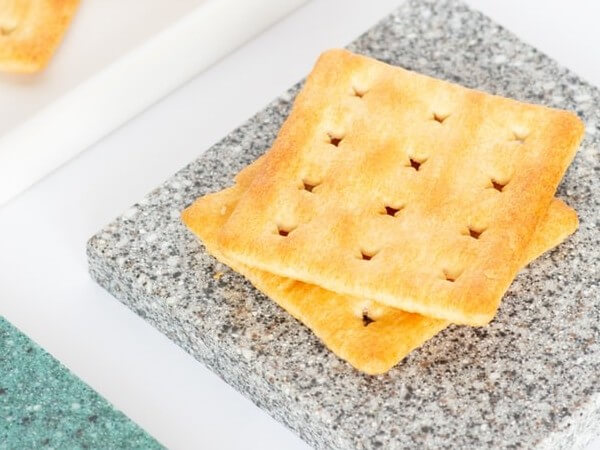
From the list of ingredients, we can confidently say that dogs should not eat Wheat Thins because Wheat Thins are bad for dogs. If the list of ingredients didn’t scare you away, let’s take a look at the harmful health effects Wheat Thins have on our K9 friends.
Wheat Thins nutrition
Here is the nutritional profile of 1 Wheat Thins cracker:
Wheat Thins nutrition facts (1 Wheat Thins cracker or 1.94 grams)
| Name, Unit | Amount |
| Calories, cal | 9 |
| Total Fat, g | 0.3 |
| Sodium, mg | 13 |
| Total Carbohydrate, g | 1.4 |
| Dietary Fiber, g | 0.1 |
| Total Sugars, g | 0.3 |
| Protein, g | 0.1 |
| Calcium, mg | 1 |
| Potassium, mg | 6 |
This means that a single cracker of Wheat Thins has 9 calories, 0.3 grams of fat, and 1.4 grams of carbohydrate (0.3 grams of sugar).
As you can see, Wheat Thins contain 64.4% in carbohydrates, 31% in fats, and only 4.6% in protein. Since dogs get their regular carbs intake from their dog food, they don’t need excess carbs from snacks like Wheat Thins.
While 31% of fats isn’t much for humans, it is considered a lot for our pooch. This can lead to weight gain and obesity in dogs. This health problem can cause joint pain and arthritis in dogs later on.
Lastly, dogs can get protein from foods like eggs, chicken, salmon, and peanut butter.
Can dogs eat mini Wheats?
No, dogs should not eat mini Wheats. Mini wheats is a wheat cereal that is coated with sugar. Right off the bat, that is a no-no for dogs. In just one mini wheat, it already contains 9 calories, 0.1 grams of fat, and 2 grams of carbohydrate (0.5 grams of sugar).
If your furry family member accidentally eats a few mini wheats or eats mini wheats regularly, they can develop health problems due to the high levels of sugar, fats, and carbs.
Dog owners should keep mini wheats away from their pooch.
Can dogs eat wheat crackers?
Wheat crackers are fine for dogs that are not allergic to wheat. While they are safe for dogs, be mindful of the ingredients that are used to make wheat crackers. For instance, consider the following questions before allowing your dog to eat wheat crackers:
- How much sugar and salt was used?
- What type of oil was used to make the wheat cracker?
- Does the packaging contain preservatives like BHT or TBHQ to preserve freshness?
So, can dogs eat Wheat Thins?
Wheat Thins are not healthy for dogs and dog owners should avoid feeding their K9 friends Wheat Thins. Regularly feeding your pooch Wheat Thins can cause many health problems in dogs.
When it comes to dog food and dog snacks, consider the 90/10 rule and double-check the ingredients in the snacks. Not all human snacks are safe for doggy consumption.
Dog food and snacks not only affect our dog’s health, but also their gut health, activeness, and lifestyle. For this reason, make sure to go with healthy dog snack options instead of the Wheat Thins cracker that is in your hand.
DISCLAIMER: THIS WEBSITE DOES NOT PROVIDE MEDICAL ADVICE
The information, including but not limited to, text, graphics, images and other material contained on this website are for informational purposes only. No material on this site is intended to be a substitute for professional veterinary advice, diagnosis, or treatment. Always seek the advice of your veterinarian or other qualified health care provider with any questions you may have regarding dietary needs.
WHEAT THINS is a registered trademark of INTERCONTINENTAL GREAT BRANDS LLC. Dogleashpro does not claim any ownership of the WHEAT THINS name, logo, or any identifying mark in any way. This article is for educational purposes only.
Resources:
https://en.wikipedia.org/wiki/Wheat_Thins
https://www.nytimes.com/2013/01/25/business/media/old-line-snack-is-highlighting-fervor-of-fans.html

With over five years of specialized experience as an animal writer, my expertise lies in dog nutrition, health, behavior, grooming, and training. I am dedicated to delivering helpful and informative content that caters to the well-being of our furry friends. My primary goal is to empower pet owners with knowledge and ensure our canine companions thrive in health and happiness. In my free time, I love volunteering at local dog rescue centers.
